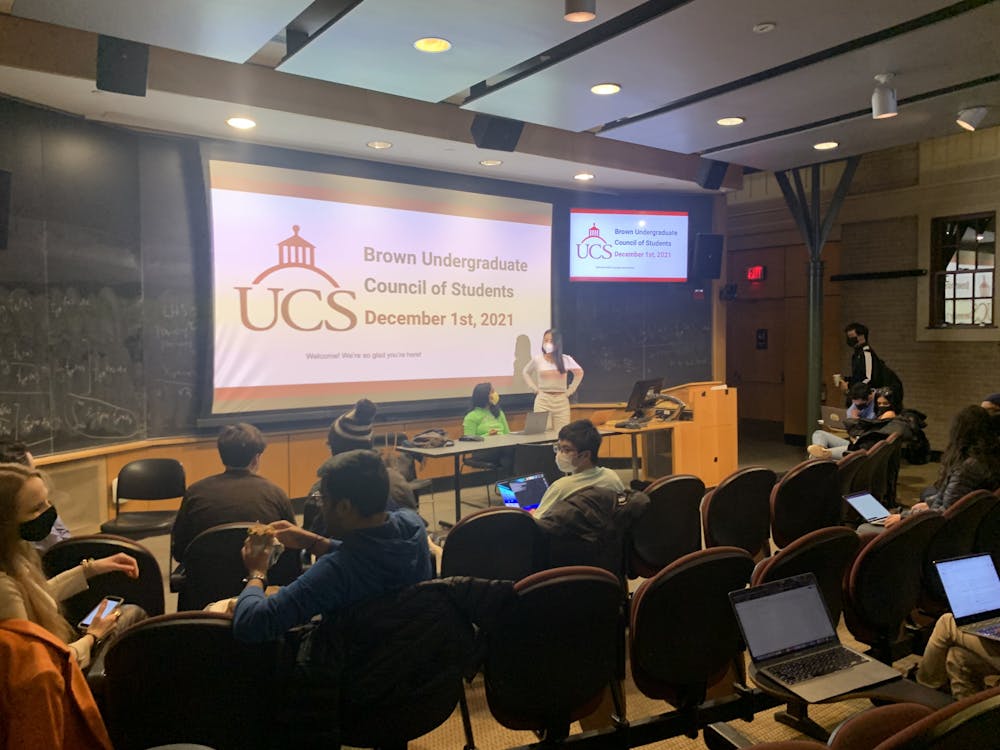The Undergraduate Council of Students held internal elections for the recently vacated Undergraduate Finance Board vice chair position at its last general body meeting of the fall semester Wednesday evening.
Before hearing speeches from the candidates, UCS treasurer Ritiika Avarrsekar ’23 spoke about the importance of the UFB vice chair as it pertains to the Council.
“Whoever is elected as UFB vice chair becomes our representative for UCS, so for any funding in the future or if we do need extra funding outside of our lump sum, the UFB vice chair is who we will have to be working directly with,” she said.
Former UCS Vice Chair Claire Brown ’22 resigned from her role the week before Thanksgiving, UCS President Summer Dai ’22 told The Herald. UFB Chair Akilesh Raman ’22 will take responsibility for the student groups Brown was assigned to guide in the UFB budgeting process as the new vice chair gets acclimated to the role, he wrote in a message to The Herald.
Each candidate was given the opportunity to give a two-minute speech, after which Council members were able to ask candidates questions.
Six candidates ran for the position of UFB vice chair: Arjun Krishna Chopra ’25, William Borges ’24, Mukul Khanna ’23, Daniel Yadegar ’22, Amienne Spencer-Blume ’23 and Chas Steinbrugge ’24.
Every candidate except for Steinbrugge currently serves on the Board as a representative. If a current representative wins the election, another special election for an at-large representative will be held in the spring.
Many of the contenders spoke about their plans to increase connections between student groups and UFB, make the process of interacting with UFB easier and increase trust and transparency between UFB and the student body.
“If elected vice president, I would … revise the outdated code of operations in order to make our operations and interactions with groups more efficient and less burdensome,” Krishna Chopra said.
“UFB is very confusing and can feel very far removed for a lot of people,” Spencer-Blume said. “The solution to this would be to set up semesterly training sessions” that are open to all individuals interested in learning about how to interact with UFB, she added.
Other proposed ideas included involving non-UFB members in policy discussions, holding open forums and office hours, taking steps to increase the diversity of the Board and creating more awareness about what UFB does.
The UCS members present at the meeting will vote via an online form that was sent out after the meeting. It was not clear how long the form would remain open or when the result of the election would be announced.
UCS also heard a presentation from #DoesBrownCare, a student group involved in advocacy for Brown Dining Services employees.
The group came about after an Oct. 3 article in The Herald outlined poor working conditions, understaffing and broken equipment in the University dining halls. The current advocacy efforts are taking place as University negotiations with the Dining Services’ union are ongoing, according to a slide presented at the meeting.
“#DoesBrownCare will coordinate efforts to advocate for the most pro-worker, pro-Black, pro-Indigenous, pro-POC union contract in this University’s history,” according to the presentation.
The organization sought to speak to UCS to begin a conversation about how the Council can support the actions #DoesBrownCare is advocating for.
“I think we can all agree that it is going to be more effective if we’re all on the same page and if we’re all working together,” #DoesBrownCare student organizer Matthew Rauschenbach ’23 said. Rauschenbach previously wrote an Oct. 8 op-ed for The Herald arguing that the University must address dining conditions.
“What I envision is something where we utilize the access that UCS has to” the administration, he added.
Some of the group’s demands include increasing worker input through worker town halls, determining how the University is compensating workers for additional work, advocating for the presence of silent observers in union negotiations and strengthening the UCS Dining Council, according to the slides presented.
Overtime work is compensated with either one-and-a-half or double a staffer’s regular hourly wage, depending on the total number of hours worked, Vice President of Dining Programs George Barboza previously wrote in an Oct. 22 op-ed for The Herald.





